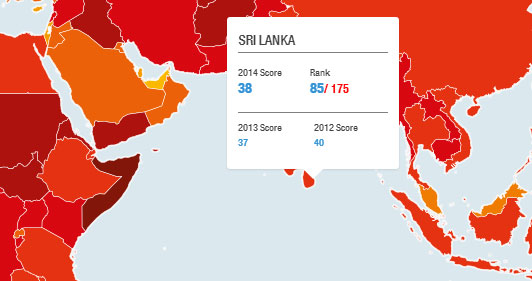CORRUPTION PERCEPTIONS INDEX 2014: CLEAN GROWTH AT RISK
Corruption is a problem for all economies, requiring leading financial centres in the EU and US to act together with fast-growing economies to stop the corrupt from getting away with it, anti-corruption group Transparency International said today.
In the 20th edition of the Corruption Perceptions Index, scores for China (with a score of 36 out of 100), Turkey (45) and Angola (19) were among the biggest fallers with a drop of 4 or 5 points, despite average economic growth of more than 4 per cent over the last four years. Click here for the full index
“The 2014 Corruption Perceptions Index shows that economic growth is undermined and efforts to stop corruption fade when leaders and high level officials abuse power to appropriate public funds for personal gain,” said José Ugaz, the chair of Transparency International.
“Corrupt officials smuggle ill-gotten assets into safe havens through offshore companies with absolute impunity,” Ugaz added. “Countries at the bottom need to adopt radical anti-corruption measures in favour of their people. Countries at the top of the index should make sure they don’t export corrupt practices to underdeveloped countries.”
More than two thirds of the 175 countries in the 2014 Corruption Perceptions Index score below 50, on a scale from 0 (perceived to be highly corrupt) to 100 (perceived to be very clean). Denmark comes out on top in 2014 with a score of 92 while North Korea and Somalia share last place, scoring just eight.
The scores of several countries rose or fell by four points or more. The biggest falls were in Turkey (-5), Angola, China, Malawi and Rwanda (all -4). The biggest improvers were Côte d´Ivoire, Egypt, Saint Vincent and the Grenadines (+5), Afghanistan, Jordan, Mali and Swaziland (+4).
The Corruption Perceptions Index is based on expert opinions of public sector corruption. Countries’ scores can be helped by open government where the public can hold leaders to account, while a poor score is a sign of prevalent bribery, lack of punishment for corruption and public institutions that don’t respond to citizens’ needs.
CORRUPTION IN EMERGING ECONOMIES
China’s score fell to 36 in 2014 from 40 in 2013, despite the fact the Chinese government launched an anti-corruption campaign targeting corrupt public officials. The government has recognized the need to follow officials who hide ill-gotten gains overseas. This January, leaked documents revealed 22,000 offshore clients from China and Hong Kong, including many of the country’s leaders.
The score matches a poor performance by Chinese companies in Transparency International’s recent report on corporate disclosure practices where all eight Chinese companies scored less than three out of ten.
Corruption and money laundering are also problems for the other BRIC countries. This year has seen questions raised related to a major oil company using secret companies to bribe politicians in Brazil (which scores 43), questions about Indians (38) using bank accounts in Mauritius (54) and Russians (27) doing the same in Cyprus (63).
“Grand corruption in big economies not only blocks basic human rights for the poorest but also creates governance problems and instability. Fast-growing economies whose governments refuse to be transparent and tolerate corruption, create a culture of impunity in which corruption thrives,” said Ugaz.
COUNTRIES ON TOP MUST FIGHT GLOBAL CORRUPTION
Transparency International called on countries at the top of the index where public sector corruption is limited to stop encouraging it elsewhere by doing more to prevent money laundering and to stop secret companies from masking corruption.
While top performer Denmark has strong rule of law, support for civil society and clear rules governing the behaviour of those in public positions, it also set an example this November, announcing plans to create a public register including beneficial ownership information for all companies incorporated in Denmark. This measure, similar to those announced by Ukraine and the UK, will make it harder for the corrupt to hide behind companies registered in another person’s name.
The anti-corruption group is currently running a campaign to Unmask the Corrupt, urging European Union, United States and G20 countries to follow Denmark’s lead and create public registers that would make clear who really controls, or is the beneficial owner, of every company.
“None of us would fly on planes that do not register passengers, yet we allow secret companies to conceal illegal activity. Public registers that show who really owns a company would make it harder for the corrupt to take off with the spoils of their abuse of power,” said Transparency International Managing Director Cobus de Swardt.

